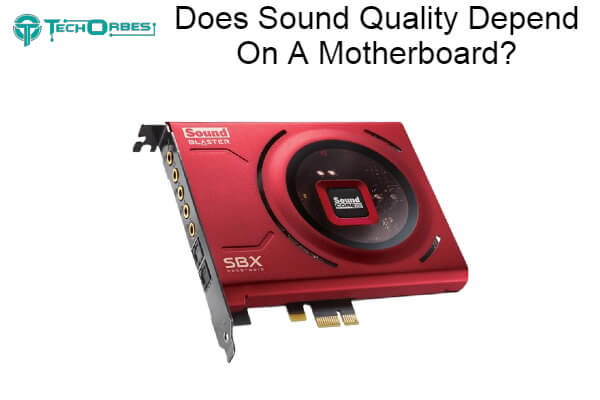Does Sound Quality Depend On A Motherboard? (Answered)
You are at the place if you are looking for Does Sound Quality Depend On A Motherboard? There are several considerations to make if you’re in the market for a new motherboard. The quantity of PCIe and RAM slots, the type of socket, the number of fan headers, etc.
However, the sound quality is something that is frequently disregarded. Does the motherboard have an impact on sound? It does, indeed. The sound from your speakers or headphones might be significantly impacted by the motherboard you purchase.
Additionally, a specific quantity of amp power is required to power high-impedance headphones. Additionally, if the motherboard’s sound-regulating components are not properly isolated, you may hear some static noise and distortion, especially at higher volumes.
How does a motherboard, though, impact sound quality? Is it that crucial to the typical user? Continue reading the article to find out more about motherboards and sound quality.
Does Sound Quality Depend On A Motherboard?
Yes, the sound card or motherboard audio quality might affect the sound output quality if everything is analog and connected via 3.5mm jacks. The motherboard or sound card only serves as filters for digital, USB, or wireless outputs, so they have little to no impact on the audio quality.

How Crucial A Motherboard Is?
Now that we’ve established that a motherboard may impact sound quality, it’s time to talk about how it does so and how crucial a motherboard is. It is hardly surprising that sound quality has improved because newer, more expensive motherboards are often better constructed and of higher quality.
Be aware that even after updating the motherboard, the typical user won’t hear much difference in the sound quality. Your choice of speakers or headphones has a much greater impact on the sound quality.
However, you should think about acquiring an Amp/DAC or a sound card rather than using the onboard audio in the first place if you have a powerful set of speakers or an expensive headset.
The audio quality you can often anticipate from a motherboard is respectable and acceptable. It serves no use to purchase a motherboard that is much more expensive to experience a marginal boost in sound quality.
However, you will notice a noticeable sound quality improvement if you switch from an outdated motherboard to a new one. You’ll also hear less distortion and static noise at greater sound settings. Additionally, the sound quality may be impacted by the proximity of the graphics card to the audio processor and audio capacitors.
Even when the speakers are not in use, a graphics card that consumes a lot of power will produce audible static noise in the speakers. However, older motherboards tend to be less effective at isolating the sound chipset from the rest of the motherboard. Thus this is mostly true for them.
Does the motherboard, however, impact sound quality? When using onboard audio, could your speakers or headset sound worse? The basic answer is that the onboard audio can considerably degrade the output sound quality if you are an audiophile and utilize a high-end audio system or very expensive headphones.
Again, the typical user won’t notice a noticeable change in this case, especially when using standard speakers or headphones. Additionally, the motherboard audio chipset won’t affect the sound quality of your speakers or headphones if you connect them via USB rather than 3.5mm; for wireless and digital audio outputs, the same holds.
Because of this, you shouldn’t believe an audiophile when they say that a motherboard’s sound quality is poor. You might not notice a significant difference. Since everyone has unique ears, what may offend you may not bother someone else, and vice versa. However, everyone may agree that distortions at louder audio levels can be a little unpleasant. In that situation, you need a good amplifier.
How Do You Choose A Good Sound Quality Motherboard?
Not you. Onboard audio is never very good. They typically operate at 16 bits and have a lot of low-level noise. Games typically use compressed 16-bit audio, so it’s more than plenty if you’re playing games. You’ll need more if you want pure hi-fi sound or if you’re producing music.
A dedicated sound card is necessary for high-quality sound. You can install a PCIe card on a desktop. You’ll need an external card if it’s a laptop. For high-fidelity sound, I always advise using an external audio interface, although they can be expensive.
Conclusion
That’s all I have on Does Sound Quality Depend On A Motherboard? Sound quality can be impacted by capacitors and sound chipsets that are included in motherboards. Unless you’re switching from a very old motherboard, the sound quality of most new motherboards is normally comparable.
Thus there won’t be much of a difference. The quality of the sound you hear is more dependent on your speakers or headphones. A separate amplifier, DAC, or at the absolute least a sound card should be used with high-end audio equipment such as headphones or speakers.
There is a lot of static interference in onboard audio from other components, such as your graphics card. And in the first place, a poor onboard sound processor cannot power high-impedance outputs.
Frequently Asked Questions
Do various motherboards have varying audio?
Onboard audio, often known as embedded sound cards, is a feature of every motherboard on the market. The issue is that sound cards cannot fit completely on motherboards since they must be compact enough to fit inside your tower. As a result, onboard audio cannot create sounds of the same caliber as a separate sound card.
What factors affect audio quality?
The equipment used to create the recording, the processing and mastering applied to the recording, the gear used to reproduce it, and the listening environment used to reproduce it all affect how well the sound of a reproduction or recording sounds.
How can the sound on my motherboard be improved?
The two most popular ways to get better audio without using the motherboard’s audio are: The most popular option is to connect your home audio system to an external USB decoder that has an amplifier or line-level outputs. The price ranges from $5 to several multiples of that, with the audio quality increasing proportionately.
Is a motherboard necessary for the creation of music?
Much more crucial is picking a good processor for music creation. The CPU is the essential element for convenience in music creation (and speed). Your CPU deserves more of your time, consideration, and money than the motherboard does. Do not misunderstand; you still require a reliable motherboard.

Rayssa is a native American. A group of specialized individuals raised her with a passion for gaming. Here she discovered that computer games can expand your creative mind to infinite possibilities. In recent years, she has gone beyond gaming as a means of entertainment to enjoy it as a passio
